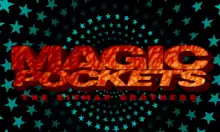Magic Pockets
Magic Pockets is a platform game developed by the Bitmap Brothers and published by Renegade in October 1991. It was released for the Atari ST, Amiga, Acorn Archimedes and PC. The title track of the game is the instrumental version of the hit single "Doin' the Do", by Betty Boo, originally released in 1990 on the Rhythm King label.
| Magic Pockets | |
|---|---|
 Title screen on Amiga | |
| Developer(s) | Bitmap Brothers |
| Publisher(s) | Renegade |
| Platform(s) | Amiga, Atari ST, Acorn Archimedes, PC |
| Release | 1991 |
| Genre(s) | Platform |
| Mode(s) | Single player |
Magic Pockets also appeared as competition on the Saturday morning children's TV show Motormouth. The caller would watch the game on their TV screen at home and shout the instructions 'walk', 'jump' and 'zap' to control the character.
Game overview
A young boy, known as the Bitmap Kid, has a pair of magic trousers that contain pockets with an infinite amount of storage space, and therefore he stores all of his toys in his pockets. One day the creatures who live in his pockets decide to keep his toys for themselves and play with them, so the Bitmap Kid must go on a journey to retrieve his toys from the creatures.
The game is a platform game with standard abilities of walking, jumping, and hurling items to defeat foes. There are four areas in the game; Cave, Jungle, River and Mountain areas, each of which is split into several stages including a bonus stage where the Bitmap Kid must outdo the creatures depending on what toy is to be retrieved - for example, the Bike is found in the Cave area, and so the bonus stage is a bike race against the creatures.
The Bitmap Kid has a different attack for every area of the game, all of which may be "charged up" by holding down the fire button to throw a bigger projectile. The largest projectile has the ability to "suck up" enemies rather than destroying them - they will then be converted into pickups. Pickups range from sweets, which add points, to Silver and Gold stars which introduce another aspect of gameplay; Helmets. By collecting silver stars, the Bitmap Kid can then collect a gold star, which will produce a helmet he can wear for a limited time. Helmets vary from teleporters, to laser beams, to invincibility. He may also 'float' by using chewing gum, collected from gum dispensers in the levels, to inflate a large bubble. Bubbles can sometimes help to reach secret areas.
There is no timer in the game; however, if you take too long a transparent bubble will appear and chase after the Bitmap Kid, gradually growing faster and faster over time. If they come into contact, the bubble will trap the kid and he will lose all his power-ups, except at the last stage, where the bubble will kill him. The game moves at a rather slow pace and levels are often huge, so the bubble is an increasingly common occurrence as the game progresses.
There were plans for a Game Boy Advance version of Magic Pockets, and was officially announced in 2002,[1] however the remake has been evidently cancelled.[2]
The PC versions of the game used a rather primitive copy protection system where the game would ask for a password after the first level. The password could be obtained by referencing a password sheet shipped with the game.
Development and release
Magic Pockets was developed by The Bitmap Brothers and published by Renegade Software. Described as their first attempt at a "cutesy platform game", inspirations game came from Super Mario Bros., Rainbow Islands, and Flood.[3] With Renegade Software being part of music company Rhythm King, a remix version of Doin' the Do by Betty Boo was used for the game's opening.[4]
The game was played in-between cartoons on the Saturday morning television series Motormouth. Viewer would call in to play the game through commands they would give.[5]
Reception
Magic Pockets received generally positive reviews from video game critics.
References
- Harris, Craig (May 15, 2002). "More Bitmap Bros. on GBA". IGN. Retrieved February 9, 2019.
- Tregaskes, Kolin. "The Bitmap Brothers - Magic Pockets GBA". www.bitmap-brothers.co.uk. Retrieved 18 May 2017.
- Zero Staff (September 1991). "On the Roof With..." Zero. No. 23. pp. 16–17.
- Rand, Rand; Boone, Tim (October 1991). "Review". Computer and Video Games. No. 119. pp. 24–26.
- Diver, Mike (May 21, 2015). "A Look Back at the Legendary Bitmap Brothers Video Game Studio". Vice. Retrieved February 11, 2019.
- Upchurch, David (October 1991). "Screentest". ACE. No. 49. pp. 60–61.
- Brennan, Ciarán (September 1991). "The One Review". The One. No. 36. pp. 58–60.
- McCandless, David (October 1991). "Magic Pockets". Zero. No. 24. p. 43.